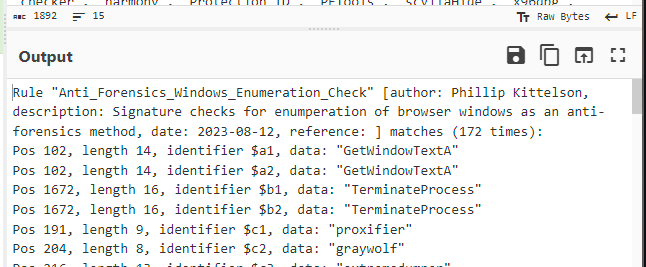CYBERSECURITY

Anti-forensics YARA rules
 Phillip Kittelson | 12 Aug 23 |
3 min read
|
Phillip Kittelson | 12 Aug 23 |
3 min read
|
Recently, Xavier Mertens, of the SANS Internet Storm Center Mertens, posted about a python script he found which uses the Windows API with a call to GetWindowText(). With my education in digital forensics, I find anti-forensics methods interesting. Anti-forensics includes methods designed to prevent, slow down, or impede static of dynamic analysis.
The code of interest is shown below. The defined check_windows() method further defines winEnumHandler, with calls to GetWindowTextA(), and checks for a list of stings from an array. These strings are common debugging or forensics tools which are often installed in a forensics virtual machine or sandbox. After checking for the tools, the code attempts to determine the ProcessID of the window, and terminate it with TerminateProcess():
def check_windows():
@ctypes.WINFUNCTYPE(ctypes.c_bool, ctypes.POINTER(ctypes.c_void_p), ctypes.POINTER(ctypes.c_void_p))
def winEnumHandler(hwnd, ctx):
title = ctypes.create_string_buffer(1024)
ctypes.windll.user32.GetWindowTextA(hwnd, title, 1024)
if title.value.decode('Windows-1252').lower() in {'proxifier', 'graywolf', 'extremedumper', 'zed', 'exeinfope', 'dnspy', 'titanHide', 'ilspy', 'titanhide', 'x32dbg', 'codecracker', 'simpleassembly', 'process hacker 2', 'pc-ret', 'http debugger', 'Centos', 'process monitor', 'debug', 'ILSpy', 'reverse', 'simpleassemblyexplorer', 'process', 'de4dotmodded', 'dojandqwklndoqwd-x86', 'sharpod', 'folderchangesview', 'fiddler', 'die', 'pizza', 'crack', 'strongod', 'ida -', 'brute', 'dump', 'StringDecryptor', 'wireshark', 'debugger', 'httpdebugger', 'gdb', 'kdb', 'x64_dbg', 'windbg', 'x64netdumper', 'petools', 'scyllahide', 'megadumper', 'reversal', 'ksdumper v1.1 - by equifox', 'dbgclr', 'HxD', 'monitor', 'peek', 'ollydbg', 'ksdumper', 'http', 'wpe pro', 'dbg', 'httpanalyzer', 'httpdebug', 'PhantOm', 'kgdb', 'james', 'x32_dbg', 'proxy', 'phantom', 'mdbg', 'WPE PRO', 'system explorer', 'de4dot', 'x64dbg', 'X64NetDumper', 'protection_id', 'charles', 'systemexplorer', 'pepper', 'hxd', 'procmon64', 'MegaDumper', 'ghidra', 'xd', '0harmony', 'dojandqwklndoqwd', 'hacker', 'process hacker', 'SAE', 'mdb', 'checker', 'harmony', 'Protection_ID', 'PETools', 'scyllaHide', 'x96dbg', 'systemexplorerservice', 'folder', 'mitmproxy', 'dbx', 'sniffer', 'http toolkit'}:
pid = ctypes.c_ulong(0)
ctypes.windll.user32.GetWindowThreadProcessId(hwnd, ctypes.byref(pid))
if pid.value != 0:
try:
handle = ctypes.windll.kernel32.OpenProcess(1, False, pid)
ctypes.windll.kernel32.TerminateProcess(handle, -1)
ctypes.windll.kernel32.CloseHandle(handle)
except:
pass
exit_program(f'Debugger Open, Type: {title.value.decode("utf-8")}')
return True
while True:
ctypes.windll.user32.EnumWindows(winEnumHandler, None)
time.sleep(0.5)
The sample Xavier found is available on VirusTotal, and is detectable using a YARA rule from InQuest labs which centers around the Windows API function call. This alert is pretty high-level, and will result in a lot of false positives. I have never created YARA rules before, so with the combination of an interesting topic to me, and the prospect of learning something new, I decided to try and craft a YARA rule which would focus on code which either enumerates a window’s title text or terminates a process while looking for for the list of tools shown in the original malicious Python code.
My final YARA rule can be found here in my GitHub repo.
After setting up my YARA rule title, I define the variables to search for. In the case of both the GetWindowTextA and the TerminateProcess() calls, I use both strings, ignoring upper or lower case, and include the wide option, then define the same string as a a hexadecimal value.
$GetWindowText1="GetWindowTextA" nocase wide
$GetWindowText2={47 65 74 57 69 6E 64 6F 77 54 65 78 74 41}
$TermProcess1="TerminateProcess" nocase wide
$TermProcess2={54 65 72 6D 69 6E 61 74 65 50 72 6F 63 65 73 73}
After this, I include a lengthy list of the tools from the malicious script, also ingnoring case, and opening up with the wide option:
$WindowTitle1="proxifier" nocase wide
$WindowTitle2="graywolf" nocase wide
$WindowTitle3="extremedumper" nocase wide
$WindowTitle4="zed" nocase wide
$WindowTitle5="exeinfope" nocase wide
[continued]
For my conditions, I wanted to find binaries which referene my tool list, and either 1) try to enumerate the window title, or 2) attempt to terminate a process:
($GetWindowText1 or $GetWindowText2) or ($TermProcess1 or $TermProcess2) and any of ($WindowTitle*)
Using two different tools, I confirmed my rule would alert on the sample:
VirusTotal:

CyberChef:

Other YARA rules I come up with will be available on both my projects page, and this GitHub repo.
Back... Tags: cybersecurity